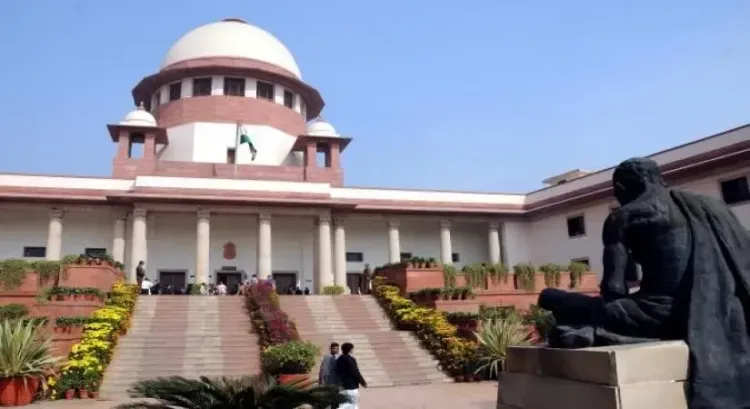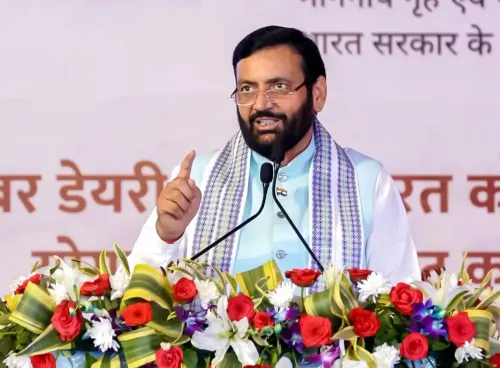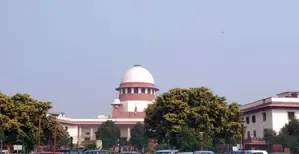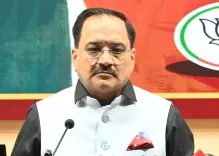Will Justice Gavai's Bench Hear the Challenges to the Waqf (Amendment) Act?

Synopsis
Key Takeaways
- The Supreme Court will hear challenges to the Waqf (Amendment) Act, 2025.
- Justice B.R. Gavai will preside over the upcoming hearings.
- Chief Justice Khanna is set to retire on May 13, 2023.
- The Union government aims to prevent misuse of waqf properties.
- Transparency and efficiency in waqf management are central to the amendments.
New Delhi, May 5 (NationPress) A Supreme Court bench, led by Chief Justice of India (CJI) Sanjiv Khanna, instructed that a series of petitions questioning the constitutional legitimacy of the Waqf (Amendment) Act, 2025, be presented before the bench headed by Justice B.R. Gavai for further proceedings.
At the beginning, CJI Khanna mentioned that the bench, which includes Justices Sanjay Kumar and K.V. Viswanathan, has reviewed the pleadings, albeit not in depth, and opted not to issue an interim judgment due to his upcoming retirement.
"We will schedule this before Justice Gavai's bench on Wednesday or Thursday," the bench announced.
CJI Khanna is scheduled to retire from the apex court on May 13 upon reaching the age of 65. Following his departure, Justice Gavai, the senior-most puisne judge, will be inaugurated as the 52nd CJI.
In the prior session, the Supreme Court allocated a week's timeframe for the Centre, state governments, and Waqf Boards to submit their initial responses.
The court decided to categorize five writ petitions as lead cases, indicating that other petitions will be treated as intervention applications. Furthermore, the registry was instructed to rename the case titles to "In Re: The Waqf (Amendment) Act, 2025".
During the hearing, the Union government assured the Supreme Court that it would refrain from de-notifying provisions concerning 'waqf by user' or appointing non-Muslim members to the Waqf Board.
While scheduling the matter for further discussion on May 5, the apex court specified that the upcoming hearing will serve as a preliminary session, with the possibility of issuing interim orders if necessary.
In its preliminary affidavit, the Centre stated that the amendments were introduced to curb the misuse of waqf legislation, which had led to encroachments on government properties, while also ensuring that Waqf Boards operate transparently and effectively.
"Reported misuse of waqf provisions to encroach on private and government properties is quite alarming. Since the amendment enacted in 2013, there has been a 116% increase in waqf areas," noted the Union Ministry of Minority Affairs.
The Centre's response to the Supreme Court indicated that many Waqf Boards had been operating in a "highly non-transparent manner", often failing to provide complete details to the public domain. It highlighted that, under previous regulations, inadequate safeguards allowed government and private properties to be misclassified as waqf properties.
"Sections 3A, 3B, and 3C address the ongoing issues that have persisted for decades. There are alarming instances where government or private lands were wrongly classified as waqf properties," the affidavit stated.
The Union government emphasized that the Waqf (Amendment) Act, 2025 was enacted to modernize the management of waqf properties in India through transparent, efficient, and inclusive practices. The reforms focus solely on the secular and administrative components of waqf institutions – including property management, record-keeping, and governance – without infringing on any fundamental religious practices of Islam.
On April 28, the Supreme Court declined to entertain a new petition challenging the amendments to the Waqf Act of 1995. The CJI Khanna-led Bench advised the petitioner that it cannot manage numerous petitions on the same issue, suggesting the option to file an intervention application regarding the challenges to the Waqf (Amendment) Act, 2025, if desired.










